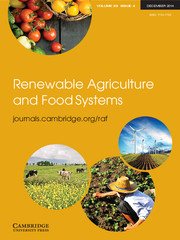No CrossRef data available.
Article contents
A new conservation education delivery system
Published online by Cambridge University Press: 05 March 2007
Abstract
The Conservation Agriculture Project (CAP) of the North Dakota Natural Resources Trust (Trust) has demonstrated a new concept for delivering conservation education that improves farm economics while enhancing environmental health, restoring landscape functions and providing societal benefits. The 5-year project, initiated by the Trust in 2000, incorporated Resource Analysis Teams to assist four farmers and farm families serving as a demonstration in developing and implementing holistic farm plans. Resource Analysis Team members were agricultural, environmental, conservation and economic professionals. Resource Analysis Teams met with each demonstration farm family twice each year in a non-threatening setting, usually around the family's kitchen table. The integration of diverse knowledge bases resulted in an educational roundtable with all participants being educators and students at the same time. As round-table participants became familiar with the intricacies of each particular farm and with each other, adversarial relationships dissolved and team members worked together to move the farms toward sustainability—economic, environmental and social. This approach differs from most federal conservation programs to date, which have approached on-farm conservation in a piecemeal manner, only protecting a parcel of land or a critical problem area. For those programs, responsibility for searching out and implementing conservation practices has fallen primarily on the farmer, who also has had to assume associated risks. The Conservation Agriculture Project has demonstrated that the Resource Analysis Team approach yields positive results for the environment, wildlife, farm families and society while enhancing information delivery and improving communication and acceptance among diverse groups with varying agendas. Most importantly, it has demonstrated the need and positive impacts of delivering conservation education directly to farmers and ranchers, who manage 43% of the land nationwide.
Keywords
- Type
- Research Article
- Information
- Copyright
- Copyright © Cambridge University Press 2007


